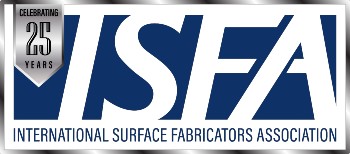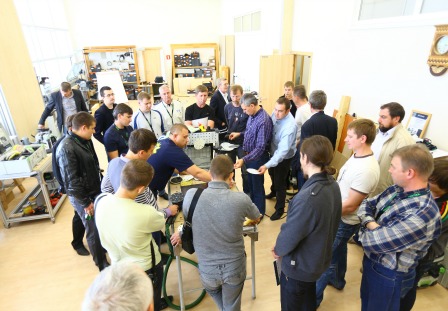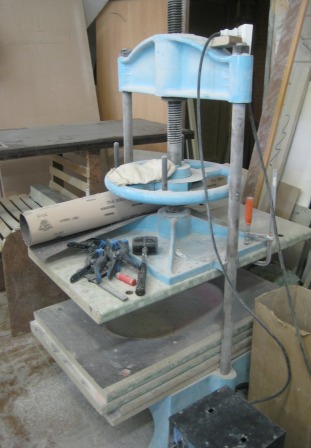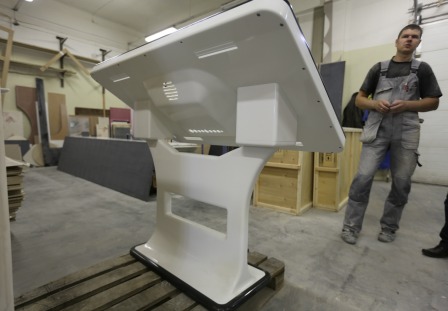Countertops Magazine ArchiveSolid Surface in RussiaI recently had the opportunity to visit Moscow and St. Petersburg and explore the Russian world of solid surface. The weather was great, the people were awesome and my trip the experience of a lifetime. The objective of my visit was to conduct business with Akrilika, one of Russia’s leading providers of solid surface, and to explore the possibilities of starting a branch of ISFA in the region. The trip was prompted by a meeting with two executives from Akrilika, who had been in the United States earlier this year to visit fabricators and attend the Kitchen & Bath Industry Show (KBIS) in Chicago. While there, the representatives of Akrilika and I had the opportunity to meet with Mike Nolan, ISFA’s director of education, to discuss the concept and benefits of ISFA, especially in the area of fabricator training, and that resulted in an invitation to visit the company on its home turf. Akrilika Akrilika (www.akrilika.com) is one of the top three or four providers of solid surface in Russia. The company was started in 1993 as a supplier of automotive paint and began its experience in surfacing as a DuPont Corian distributor. About five years ago the company began offering its own brand of solid surfacing. Headquartered in Moscow, with branch offices in St. Petersburg and Kazan, Akrilika has an extensive network of dealers throughout Russia, claiming to provide material for 20,000 kitchens a year. The company has a full line of products with 150 colors, including the Kristall and Design groups providing unique aesthetics. Recently they have introduced the Deco brand of decorative relief panels with engineered solutions including LED lighting packages, finished wood trim and mounting systems. In addition to solid surface, Akrilika also offers tools and tooling from Festool, Bessey and other major brands. Akrilika is proud of its 5-star approach to business with a particular emphasis on technology and training. Three full-time employees participate in the training process for the company’s fabricator customers. Along with certification training provided at central locations, Akrilika conducts training throughout Russia with the cooperation of its dealer network. As the provider of Festool products, Akrilika has forged an alliance with Festool that also allows them to offer training at the Festool’s new state-of-the-art facility in Russia. Festool Festool (www.festool-usa.com) new facility is located just outside of Moscow. The location is in an industrial park dedicated to German companies doing business in Russia. The facility contains a showroom, training rooms, a complete shop for demonstration and training, conference rooms, offices, service area and warehouse. While I was there, the site was the location of a full-day program in solid surface tooling technology, attended by more than 30 fabricators. At the top of the agenda was a presentation on the benefits of membership in ISFA, and there was wide interest in developing a branch in Russia.
More than 30 fabricators turned out for the training sessions at the new Festool facility outside of Moscow One of the aspects of Russian fabrication that is interesting is that, in general, there is a preference for finishes that are of a higher sheen than the common finishes in the United States. As an example, a typical “matte” finish in Russia might be accomplished with these grits: P80, P150, P220, P320, P400, P500, P800 and P1000. Part of the training at Festool was a demonstration and some hands-on experience with developing a gloss finish on dark solid surface products. My new friend, Sergei Rachkov, from Akrilika demonstrated his recommendations for finishing a black solid surface. His command of the process has led me to name him “Tsar of Finishing” in Russia! The fabrication shops that I visited are an interesting mix of old methods blended with a thirst to integrate new processes and technologies. Virtually all shops had some capacity for thermoforming, from a basic jig utilizing a hand-held heat gun to a state-of-the-art membrane vacuum press. Laser cut artwork/photos and LED features were prevalent. Shop facilities were usually located in industrial parks, many having been converted from Soviet-era government buildings. At one material warehouse I was amazed to look in one direction and see pallets of solid surfacing, while turning around to see some mothballed missiles and parts of the Soviet space shuttle in another. Unbelievable! There is still quite a bit of hand work as compared to the typical shop in the United States. The use of CNC equipment is rare, however the rate of growth of the solid surface industry is accelerating to the point where the quest for efficiencies will likely drive more CNC use in the future. I see many similarities in the state of the countertop business in Russia with the way things were in the United States in the mid- to late-eighties. One big difference is that many of the Russian shops have developed business outside the boundaries of countertops. It will be interesting to see how the market for solid surface (they call it “artificial stone”) evolves over the next five to 10 years. The Shops The first shop we visited was Askold (www.askold-a.ru), a 5-year-old company situated in a Moscow industrial area. Although the shop was small by U.S. standards, the company is a player in supplying the fast food industry. Not only do they fabricate solid surfacing, but they also have expertise in furniture, cabinetmaking, upholstery and metal working. Their scope of work is not unlike the typical “décor vendor” in the United States that supplies a variety of fast food related products to that industry. Many of the hand tools used at Askold are Festool products, including the circular saw and rail system (with Gecko suction clamps), routers, sanders and dust extractors. It uses Bessey PS55 solid surface seaming tools (suction seam clamps) for pulling seams. Bar clamps are commonly used for edge build ups. Typically in Russia, “Baltic Birch” type plywood is used for support strips. It is actually a cheaper option than MDF! Located in a repurposed Soviet-era military facility, Stonecom (www.stonecom.ru) was the second shop we visited. One of its features was a shop-built thermoforming oven that is used for both residential and commercial business. The company was working on a large retail fixture project. It had also just completed a project using solid surface cabinets and tops for a fast food client. On its web site Stonecom publishes standard countertop pricing for various products plus the cost for a number of accessories, delivery and installation. By the way, Stonecom accepts Master Card and Visa. Started in 1994, Storm (www.storm-spb.ru) is one of the oldest fabricators in Russia. From museums, theaters and casinos to residential kitchens and apartment projects, the designers and fabricators at Storm have quite a portfolio of completed projects. Along with the traditional countertop business, they have created various parts for equipment and electronics manufacturers, including a solid surface module for card readers that are used in turnstiles around the world. This shop in St. Petersburg is a bit larger than others I visited, but it still has that feeling of a U.S. shop in the 80s or early 90s. Storm does use a sliding table saw for cutting sheets. Since space is at a premium, sheets are stored vertically, as in most shops I visited. My first visit to Prima (www.spbprima.ru) was at its showroom location within a large furniture mart. The space featured routed carving and inlays, vanity and countertop displays and quartz surfacing. Following some discussions about the techniques they use for inlays, we drove to the company’s fabrication shop. The first stop was their pride-and-joy CNC machine, which was hard at work producing a drainboard in a kitchen countertop. Although smaller than what we might see in the United States, this machine is a workhorse. I could also not help but notice a hand-operated press used for manufacturing bathroom sinks. Like other Russian fabricators, Prima manufactures standard and custom sinks from sheet material through a process of fabrication and thermoforming. The company had made their own thermoforming oven, plus they use electric/silicone heat strips for thermoforming edge pieces. The 20 or so employees work in a number of small workrooms with standard hand tools. Major cuts are made with a Festool rail system and circular saw. Toward the rear of the facility is a quartz fabrication shop. Working with hand tools, a crew of three was routing and polishing a quartz kitchen top. In Russia, quartz is still very expensive so the labor-intensive process can still be profitable. The amazing part is that there is no material handling equipment except for some small carts. The slabs are unloaded by hand and wheeled into the shop area. From there, they are manhandled for the rest of the fabrication process.
Fabrication company Prima, like other Russian fabricators, manufactures standard and custom sinks from sheet material through a process of fabrication and thermoforming. The company’s bowl press is hand-operated Restone (www.restone.ru) is a company facing transition. Much of its previous work was focused on the casino industry, but recent regulations in Russia have all but eliminated that. Now it’s involved with manufacturing kitchen and bathroom tops, but its history has given the company an advantage in creative use of materials and thermoforming. Restone’s interactive video monitor fixture is one of its showcase pieces. Constructed of solid surface, it is both a piece of sculpture and an engineering challenge. And, for the most part, it is fabricated using basic technology with hand tools and ingenuity. The company uses all the normal hand tools, plus a sliding table saw for cutting full sheets. It has a large metal lathe that is used for creating molds, a pin router for trimming custom made bowls and a molder outfitted with a saw blade for trimming the thermoformed piece of the monitor fixture. Restone has also established a special finishing room for high-finish, polishing and other specialty work.
Many fabricators in Russia also work outside of the countertop market. Restone’s interactive video monitor fixture is one of its showcase pieces. For the most part, it is fabricated using basic technology with hand tools and ingenuity The solid surfacing industry in Russia has the potential to be huge. Although it is early in its development, there is a fabricator infrastructure ready to take advantage of the growth opportunities that lie ahead. At training sessions in Moscow, St. Petersburg and the Festool Center, we presented the concepts and benefits of ISFA to a range of fabricators and suppliers. And the response was excellent. Over the next year, ISFA will be assisting the fabricators of Russia in becoming ISFA members and establishing a strong ISFA network in that country. They are excited about sharing training techniques and fabrication processes with other ISFA members worldwide. With the help of Festool, Akrilika and other potential Associate Members, we believe that ISFA-Russia will become a strong and active part of the ISFA family. For more information contact Chuck Sawyer at [email protected]. |



